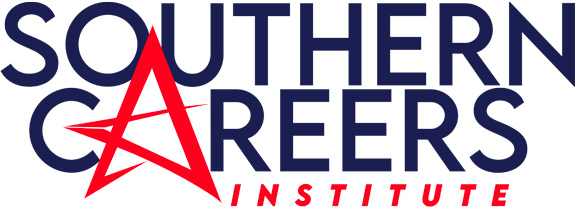Employment in health care is growing rapidly.
Right now, jobs offered in health care are stable and well-paying. Here, we will take a look at the training necessary for you to get an entry-level hospital job.
The best way to get an entry-level job at a hospital is to have job-specific training. Southern Careers Institute offers a variety of programs in the medical field that can prepare you for hospital employment in five to thirty-six weeks, depending on the program.
Students also have the opportunity to sit for certification exams and to take part in externships for hands-on experience and on-the-job training before graduation.
What Jobs Can You Do in a Hospital?
Hospitals employ many people with all levels of education and expertise. Specifically, support staff is needed in virtually every department.
According to the U.S. Bureau of Labor Statistics, employment in healthcare occupations is expected to grow much faster than the average for all occupations. Also, those employed in hospitals enjoy full-time work, job security, and benefits. And fortunately, it is easy to get an entry-level hospital job with a little training!
Some of the entry-level hospital jobs available and descriptions of what they do include the following:
Certified Nursing Assistant (CNA)
A nursing assistant, sometimes referred to as a nurse’s aide or home health aide, provides basic nursing and personal care. They provide care to the elderly and persons with disabilities, chronic illnesses, or cognitive impairment in hospitals and long-term care facilities.
Those interested in this work should be patient and compassionate with good communication skills and good physical stamina. They are also often required to have a minimum of an 8th-grade education and complete a state-approved education program.
They are then eligible to become certified in cardiopulmonary resuscitation (CPR) and nursing assistance (CNA).
The job duties of a CNA include:
- Measuring patients’ vital signs such as heart rate and temperature
- Bathing patients
- Helping with dressing and visiting the bathroom
- Serving meals and helping patients eat
- Turning and transferring patients to beds and wheelchairs
- Listening to patients and recording their health concerns
It is also important to note that as the population ages, more people wanting to work in this field will be needed.
Medical Assistant
To work as a medical assistant, some understanding of how the human body functions is needed. Additionally, to qualify for an entry-level position, candidates are required to learn how to read vital signs, perform CPR and EKGs, draw blood, and do basic lab work.
Furthermore, certifications are helpful to get a foot in the door. Medical assistants may work with physicians, physical and occupational therapists, or chiropractors, to name but a few. Their job duties include the following:
- Recording patients’ medical histories and personal information
- Measuring vital signs
- Assisting doctors with patient examinations
- Scheduling appointments
- Drawing blood and preparing it for lab tests
Medical assistants must also have the ability to keep patients’ information confidential.
Pharmacy Technician
Pharmacy technicians take a vital role in patient care by assisting pharmacists. To qualify for entry-level work in this field, one must understand pharmacy operations and prescription processing. Additionally, knowledge of FDA drug safety rules and regulations and drug compounding skills are required. Also, the Pharmacy Technician Certification (PTCB) authorized by the Board of Pharmacy is a definite plus.
A pharmacy technician’s job duties are:
- Collecting information needed to fill prescriptions
- Measuring amounts of medication
- Packaging and labelling prescriptions
- Organizing inventory and alerting pharmacists about stock shortages
- Authorizing prescriptions
In hospitals, pharmacy technicians may also assist in the preparation of a greater variety of medications, such as intravenous drugs. They may also distribute medication to patients in hospital rooms.
Medical Billing and Coding Specialist
Medical billing and coding specialists translate hospital procedures into a code that is understood by insurance carriers and other payment agencies like Medicare and Medicaid.
They must have knowledge of medical terminology as well as an understanding of the tests and procedures that are performed on patients. They must also be aware of all the corresponding codes.
Entry-level job duties include the following:
- Data collection
- Documentation
- Diagnostic and procedural coding
- Insurance claim completion and submission
- Following up on claims
- Updating insurance rules and regulations
Medical billers and coders work as a liaison between hospitals and billing offices.
Medical Office Assistant
Basically, a medical office assistant performs the tasks that keep a medical office running efficiently while doctors and nurses tend to patient health.
In a hospital setting, job duties may include the following:
- Bookkeeping
- Patient data collection
- Answering the telephone
- Handling correspondence
- Records management
- Billing and collections
Medical office assistants are also eligible for certification as Certified Medical Administrative Assistants (CMAA).
Hospital Jobs with a High School Diploma
Can you work in a hospital with a high school diploma and no experience? It is possible to find work in a hospital with only a high school diploma in the areas of housekeeping, plant operations, or as a patient sitter.
Most available jobs, however, require additional specialized knowledge and training. For example, even a sitter probably should know CPR. To become certified in any area, at least some coursework must be completed. Competition for jobs also requires additional training as some hospitals will not consider hiring those with no previous experience or certification.
Entry-level Hospital Job Prep at SCI
The best way to get an entry-level job at a hospital is to first get training in the area you are interested in working.
Southern Careers Institute offers online and on-campus training programs in Medical Assistance, Medical Billing and Coding, Medical Office Specialist, Nurse Aide, and Pharmacy Technician.
Our students not only get hands-on training through our externship courses, but they also qualify to sit for certifications. Certifications are available in the following:
- CPR (Cardiopulmonary Resuscitation)
- CNA (Certified Nursing Assistant)
- CMAA (Certified Medical Administrative Assistant)
- PTCB (Certified Pharmacy Technician)
- CCMA (Certified Clinical Medical Assistant)
- CPT (Certified Phlebotomy Technician)
- CET (Certified EKG Technician)
- EHRS (Electronic Health Records Specialist)
- and Microsoft Word, PowerPoint, Excel, and Outlook.
So, what are you waiting for? Get a fresh start by taking on a new path.
Apply at Southern Careers Institute or call 1.833.SCI.TEXAS today to learn more about the opportunities that are available to you in the medical field!
Our graduates have access to the student career services portal, “SCI Connect”, where employers in Texas can match their needs to the skills of our students.
Sources
- https://www.bls.gov/ooh/healthcare/home.htm
- https://www.bls.gov/ooh/healthcare/nursing-assistants.htm#tab-2
- https://www.bls.gov/ooh/healthcare/medical-assistants.htm#tab-2
- https://www.bls.gov/ooh/healthcare/pharmacy-technicians.htm#tab-2
- https://www.bls.gov/ooh/healthcare/medical-records-and-health-information-technicians.htm#tab-2
Blog Disclaimer: Information stated in this blog is for general information purposes only. SCITexas.edu does not assume or guarantee income earning potential or salary expectations based on the programs offered at Southern Careers Institute. Career and program information stated in this blog does not guarantee that programs and specifics are offered at Southern Careers Institute.
This article was published on: 04/20/20 9:30 AM
* SCI does not guarantee employment or a starting salary upon graduation, completion, or withdrawal from SCI. As an accredited post-secondary institution, SCI has various federal financial assistance programs available for students who qualify and are enrolled in SCI programs. This does not apply to seminar students.
GI Bill® is a registered trademark of the U.S. Department of Veterans Affairs (VA). More information about education benefits offered by VA is available at the official U.S. government Web site at http://www.benefits.va.gov/gibill.

